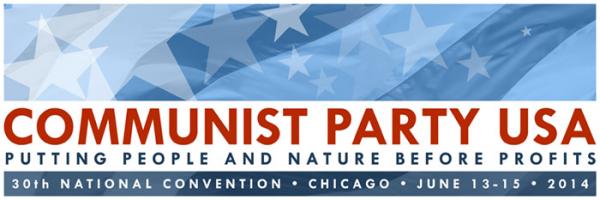
Submitted by Luis Rivas, Southern California
It’s a double-edged sword, this noble task of uniting.
The Communist Party, USA, is a working class organization that aims to be inclusive of all groups of people in the country. We are a multi-ethnic, multi-racial, multi-generational and multi-gender organization (among a sea of other groups). We make it an intentional effort to be as representative of our diverse country as possible.
But conflicts arise when people come together. Like the melting pot theory, it’s a great idea but riddled with unresolved issues. Putting people together without covering some much-needed dialogue is a recipe for disaster.
It’s fairly easy to notice a few things in both the YCL and Party. Looking at the ethnic and gender of the national leadership of the Party, one notices that it has been almost consistently white older men.
You will find only a few have not been white older men: Elizabeth Gurley Flynn or African-American Henry Winston. A push for more people of color (POC), and women of color especially, to be guided into positions of national Party and YCL leadership would do our organizations much good for many reasons, such as:
-
In order to get more POC interested in radical politics, we have to be in positions of leadership and influence. Anything short of this makes it an appearance of non-POC opportunism. This is actually true for all desired groups which organizations wish to reach out to; that desired group has to be the one at the forefront of outreaching.
-
Additionally, POC feel more comfortable in spaces where we are not a numerical minority. The Southern California Young Communist League has been a great space for developing theory, praxis and general building of our movement with an intentional leadership and body made up of POC.
Another great example is found in Southern California District Organizer Rossana Cambron’s article and proposal for a women’s equality conference.
But even with POC in leadership, and we are fortunate to have local examples of that here in California, the problem remains. We have to study all forms of oppression.
As communists, we do a disservice to our movement by limiting our analyses without factoring other forms of oppression, such as sexism, homophobia, transphobia, ableism, racism and colonialism.
Identity politics and privilege
While it is true that the idea of privilege is not one of the strongest focuses in Marxism, the argument shouldn’t therefore be to disregard it, which dangerously comes close in Dee Myers’ recently published article.
Privilege as a natural extension of identity politics has its roots in methods of survival for oppressed and marginalized peoples.
LIES, a material feminist collective, published some poignant analyses on identity politics. In a section of the book dealing with the Occupy movement, the contributors reflect how difficult it was addressing issues of oppression. When bringing up said issues, many were told that they were being divisive and just carrying on about identity politics. When the predominately white and middle-class student leadership cast aside criticisms as merely “identity politics,” it further marginalized already-marginalized voices.
Critically speaking, there are at least two ways to be against something: the reactionary way and the revolutionary way. This is a vulgar simplicity but allow me to get away with it for now.
The reactionary way to be against identity politics would be to tout the line that we are all equals; and gender, ethnicity or nationality, since it’s a social construct, shouldn’t be the focus of our movement.
That said, I am against identity politics much the same as the contributors to LIES, primarily because capital and its contradictions perpetuate these identities. In the selected text below, the author outlines identity politics while referring to her experience within the Occupy movement:
Already, in conversations with supposed comrades, our critiques have been met with concern that the “mainstream” won’t get it, that the precious, delicate momentum will be stopped. Interventions into a whitewashed and patriarchal agenda (which is any agenda that denies the differential impact of capital on people of color and women) are always received as interruptions. At best, they are conceded to with invitations, with “outreach,” and with promises to be more inclusive. We say: inclusivity without an adequate analysis is just unstated exclusivity. This is not identity politics: this is the anti-identity politics. For it is capitalism that pushes us to rank facets of our identities, to select one group as the vanguard and press marginalized identities to choose which aspect of their oppression to make a priority. We refuse this choice: we know that our differences are daily produced and reproduced within capitalism’s limits, and therefore cannot be erased within it.
-W.&.T.C.H. LIES: a material feminist journal, “On the Recent #Occupations: Communique From W.&.T.C.H. Halloween 2011, Baltimore, Amerikkka.”
The correct Marxist approach to identity politics is simply to ask: where did it come from? And the answer will come: the material conditions and the internalized domination of the values of a capitalist superstructure that are found in each and every one of us. Simply stated, the culture of oppression is in all of us, radical, reformist or reactionary. If oppressed people, such as women of color, want more control over their space, movements and the organizations they are attached to, how arrogant must it appear when some say, “No, comrades, that is identity politics. You’re being un-Marxist.”
The truth is Marxism is the best approach in understanding the world and how it works. But ignoring issues of distinct racial, ethnic and gender oppression is a death sentence for the Party-a sure way to turn the CPUSA into the white male-led vanguard of the working class.
U.S. imperialism and the national question
In order to study the experience of poor, working and oppressed people in the U.S., we have to understand the roots of our country. This includes white supremacy, colonialism, racism and indigenous genocide. That understanding should never leave our minds or our radical ideology. Everything else must be built upon this. Indigenous genocide, much like slavery, is a part of the very pillars of the structure of the U.S. (its government, prisons, military, education, media, entertainment, etc.)
Hundreds of years later into the 21st Century, we still battle with this reality; racism, as an institutionalized form of discrimination, coupled with its more subtle cousin, internalized oppression, are still around today and claim victims every day.
The cases are so numerous that there isn’t enough room in my article to list them all. But one example is the recent police killing of Carlos Mejia as a burglary suspect in Salinas, California, on May 20. But the killing didn’t stop there. The subsequent outcry by the community has been met with more instances of police brutality which claimed the life of farmworker Constantino Garcia.
In addressing racism against Native Americans, African Americans, Latinos, Asian Americans and other groups, the national question must be a central issue for communists.
National oppression exists, and although we have been conditioned to think that a nation of people is solely defined by its nation-state borders, that is not true. Nations, such as the indigenous peoples of the Americas, or the violently transplanted people of African descent or the surplus immigrant labor of people of Latin American descent, all constitute as nations. And they are oppressed by U.S. imperialism.
Everything else builds from this and in order to fight against it effectively, our struggle is the Native American, Chicana/o and all other indigenous people of the American continent’s struggle.
Proposal on Party education
I propose that the Party mandate that all its members take classes on learning the history of U.S. national oppression and, for lack of a better term, battling white privilege within our ranks.
A simple and easy way that non-POC comrades can do this immediately is by looking within their organizing space and to see if they’re dominating conversations, committees and other projects. Many POC could benefit if our non-POC comrades took a step back or stepped down enough for POC, especially women of color, to voice concerns, opinions or proposals.
Lastly, I would suggest that the Party begin or continue in popularizing the contributions of radical POC in our Party and country, such as Harriet Tubman, Nat Turner, Lucy Parsons, Toypurina, Frederick Douglass, Malcolm X, W.E.B. DuBois, Henry Winston and countless others.
The views and opinions expressed in the Convention Discussion are those of the author alone. The Communist Party is publishing these views as a service to encourage discussion and debate. Those views do not necessarily reflect the views of the Communist Party, its leading bodies or staff members. The CPUSA Constitution, Program, and all its existing policies remain in effect during the Convention discussion period and during the Convention.
For details about the convention, visit the Convention homepage
To contribute to the discussion, visit the Convention Discussion webpage
CONVENTION DISCUSSION
30th National Convention, Communist Party USA
Chicago | June 13-15, 2014


 Join Now
Join Now